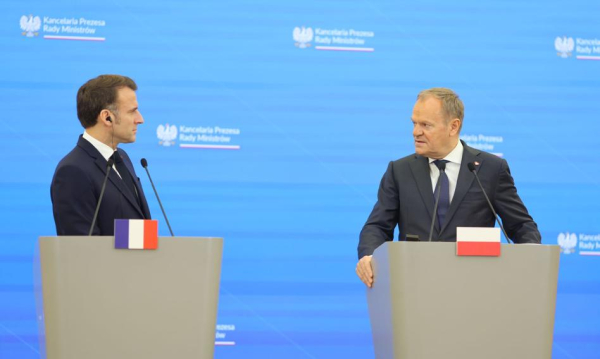It is worth talking to France about increasing the contribution of its nuclear deterrence to the security of Europe; the more risk factors for Russia, the better for deterrence and for us – said PISM analyst Artur Kacprzyk in an interview with PAP.

Work is currently underway on a new Polish-French intergovernmental treaty on cooperation, which is to replace the document in force since 1991. As Prime Minister Donald Tusk said last Thursday after a meeting with President Emmanuel Macron, work on the treaty is currently in its final stages. Although Tusk admitted that he would not reveal the details of the treaty for now, he assessed that there are many indications that it could be groundbreaking in terms of mutual security guarantees.
In recent weeks, the French president has made a wide-ranging statement about opening a “strategic debate” on protecting Paris’ partners on the European continent through French nuclear deterrence. Macron has stipulated that decisions regarding these weapons will remain the exclusive domain of Paris, but he has referred to the broad scope of the concept of France’s “vital interests,” which are mentioned in the nuclear doctrine.
Artur Kacprzyk, a PISM analyst who deals with issues including nuclear deterrence, told PAP that “the interest of allies in dialogue with France on the role of its nuclear forces in their protection is much greater today than when it proposed such talks in the past”, which – as he said – had been taking place since the 1990s. He pointed out that Poland, as well as Germany and the three Baltic states, expressed interest in dialogue with France on this issue.
“This is determined by uncertainty about the future of US involvement in NATO, combined with Russia’s increasingly aggressive policy and nuclear threats. It is worth talking to France about increasing the contribution of its nuclear deterrence to European security, but we must bear in mind the limitations of what it wants and can offer to allies,” the expert noted. The more risk factors for Russia, the better for deterrence and for us. The French nuclear arsenal could better complement the American one in protecting allies, “he added.
Kacprzyk assessed that the scenario of the US leaving NATO is still unlikely, but “no longer unimaginable”. “It is therefore worth thinking about how to try to maintain nuclear deterrence in Europe in such a situation. Although from a military point of view it would be much less reliable in protecting allies than the American one, greater reliance on the nuclear capabilities of France and Great Britain would be the fastest available solution. The best would be to acquire our own nuclear weapons, but this would be a long, difficult, risky and expensive process for Poland and other European countries,” he said.
Despite this, he noted, France’s capabilities to use nuclear weapons in defense of allies are much smaller than those of the United States. “France has a nuclear potential that is many times smaller than the United States and Russia, and most of its nuclear forces are dedicated to defending its own territory,” he noted.
“(France) has greater nuclear capabilities than Great Britain, because (it has) not only intercontinental ballistic missiles launched from submarines, but also cruise missiles carried by aircraft. The former are primarily a weapon of massive retaliation, and it would be a last resort: carrying it out in response to an attack on an ally would be suicidal for France, because Russia would most likely respond with a massive nuclear strike on France,” the analyst explained.
He added that “the Russians are thinking about using nuclear weapons in Europe primarily in terms of more limited strikes.” “They would intimidate the enemy with the prospect of further escalation and force concessions. A more credible response to such attacks would be a proportionate, selective counterattack – and France has certain capabilities in this area, which creates a certain risk for Russia, because any exchange of nuclear blows could escalate,” Kacprzyk said.
“The issue of expanding France’s nuclear deterrence has also been – as he pointed out – a subject of debate and controversy in France for years. France decided (in the 1950s – PAP) to acquire nuclear weapons, doubting American assurances about the possibility of using them in defense of allies. So far, it has not directly declared such a possibility, wanting to maintain as much room for maneuver as possible,” the analyst also emphasized.
In his opinion, in the near future we can expect “more unequivocal declarations than before from France” about the possibility of using nuclear weapons in defense of allies.
“In the current circumstances, I would expect more gradual than revolutionary steps to make such a declaration credible. I think it is likely that allies will be invited to participate more in French nuclear aviation exercises, by providing them with conventional support. More frequent visits by French aircraft capable of carrying nuclear weapons to the skies and territories of allies and emphasizing their nuclear role are also possible,” he indicated.
According to Kacprzyk, French aircraft patrolling the airspace of allies could, for example, carry cruise missiles without warheads. “However, more politically controversial and costly steps would become more realistic in the event of a drastic reduction in US involvement in NATO. Then (it would be) much more possible than now that France would decide to deploy part of its nuclear arsenal (under French control) to allies, or to expand its nuclear forces,” he added. (PAP)
mml/ mrr/